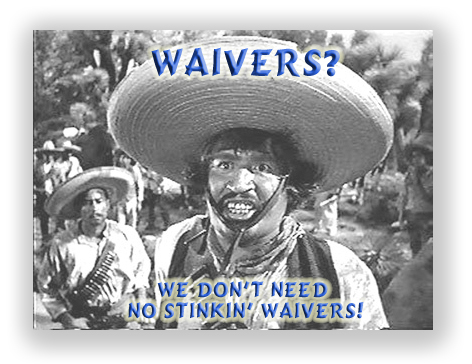We post news and comment on federal criminal justice issues, focused primarily on trial and post-conviction matters, legislative initiatives, and sentencing issues.

3RD CIRCUIT USES PLEA WAIVER TO BAR SUPERVISED RELEASE EARLY TERMINATION
 Almost all of the 97% of federal criminal defendants who take guilty pleas do so pursuant to a plea agreement. And these days, most of those plea deals prohibit the defendant from appealing or otherwise attacking the conviction and sentence.
Almost all of the 97% of federal criminal defendants who take guilty pleas do so pursuant to a plea agreement. And these days, most of those plea deals prohibit the defendant from appealing or otherwise attacking the conviction and sentence.
But up to now, no one ever thought waiver extended to supervised release. Instead, it has always been a tenet of faith that a defendant could petition the court under 18 USC § 3583(e)(1) to terminate supervised release after a year if everything had gone well.
Congress decreed that virtually every sentence of incarceration would include a post-release sentence of supervised release. Under supervised release, the post-release defendant is subject to a bevy of reporting, travel, social and financial restrictions, all overseen by a U.S. Probation Officer. On the average, a third of all former prisoners are found by courts to have violated some supervised release requirement. Given the squishy and vague conditions, not to mention the arbitrary power wielded by the Probation Officer, it’s little wonder.
Last week, the 3rd Circuit broke unwelcome new ground, holding that a plea agreement waiver of the right to challenge the sentence in any way extended even past release. Ronald Damon, according to the appeals court, “signed a plea agreement with the United States accepting responsibility for a federal crime. He served time in custody and left prison. Now, having reentered society, he wants a fresh start, free from further oversight by the federal government. So Damon asked to end his term of supervised release a few years early. He offered facts and circumstances justifying his request, and highlighted the hardships imposed by restrictions on his activities. But Damon’s present desires are controlled by a past decision: his contract with the government containing the terms and conditions of his guilty plea. Because his plea agreement precludes challenges to his sentence, and because any shortening of his supervision would amount to a change in his sentence, we will affirm the decision of the District Court.”
 The Court said that “in the agreement, Damon waived the right to file any motion or appeal that challenges the sentence imposed… Supervised release is part of the sentence that Damon received… Damon’s motion… questions his original sentence by seeking to shorten the term of his supervised release. By its very nature, it is a challenge to the sentence imposed.”
The Court said that “in the agreement, Damon waived the right to file any motion or appeal that challenges the sentence imposed… Supervised release is part of the sentence that Damon received… Damon’s motion… questions his original sentence by seeking to shorten the term of his supervised release. By its very nature, it is a challenge to the sentence imposed.”
United States v. Damon, Case No. 18-2444, 2019 U.S. App. LEXIS 23466, 2019 WL 3559045 (3rd Cir. Aug. 6, 2019)
– Thomas L. Root

